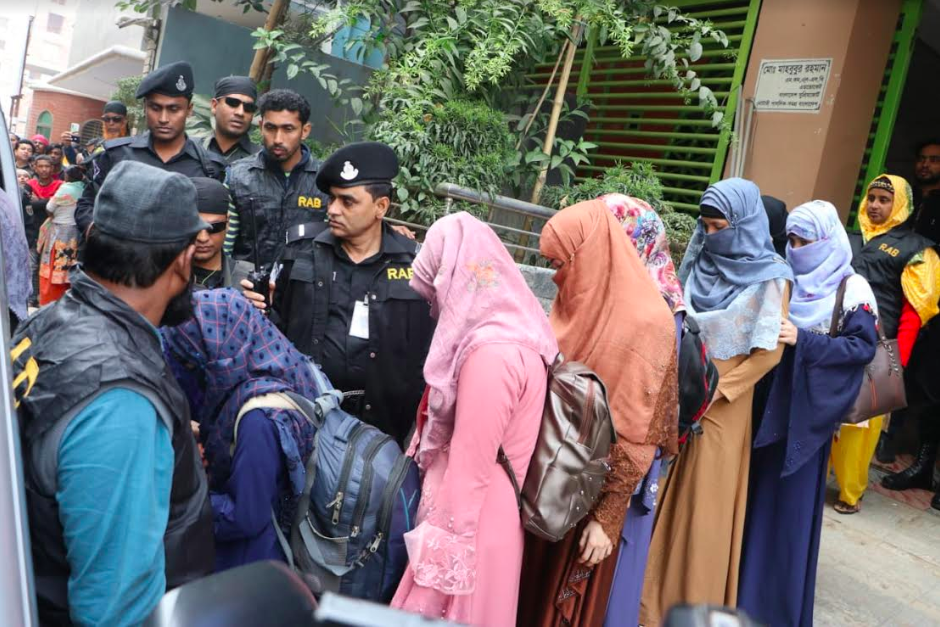DHAKA—Officials from the Bangladesh police’s Rapid Action Battalion (RAB) said on Monday they had broken up a syndicate trafficking young female Rohingya refugees to Malaysia via India, mostly to be sold into sex work.
The announcement followed Sunday’s raid by an RAB team on a house in Dhaka’s Aftabnagar neighborhood that led to the arrest of two suspected human traffickers—Kabir Ahmed, 40, of Cox’s Bazar district and Mohammad Emran, 28, of Teknaf subdistrict of Cox’s Bazar—and the rescue of 13 young Rohingya women. The officials claimed the raid foiled a bid to send the women to Malaysia.
During interrogation, Kabir reportedly told police that a man named Abdur Sabur based in Malaysia led the operation with the help of a Cox’s Bazar-based relative, Mohammad Foyez and a man named Sultan based in Kolkata, India. They lured Rohingya women aged between 18 and 22 living in refugee camps in Cox’s Bazar with promises of a better life abroad, Bangladeshi officials told The Irrawaddy.
“We arrested [Kabir and Emran] and investigators are still searching for their accomplices,” said RAB-3 operation officer ABM Faijul Islam, adding that a case had been filed in connection with the arrests and that the rescued Rohingya women had been handed over to local police.
The case investigation officer, Police Sub-inspector Fewdous Alam, told The Irrawaddy that all 13 Rohingya victims appeared on Tuesday in the Dhaka Chief Metropolitan Magistrate’s Court, where they said they had been brought to Dhaka with the promise of being given lucrative jobs in the capital and elsewhere. “We are keeping them at the Victim Support Center in Dhaka, but it has not been decided whether they will be sent back to the camps or not,” he said.
RAB officials said they found the Rohingya women at the house, which had been rented out seven months ago. They said forged documents including birth certificates and passports were seized at the scene.
During his primary interrogation, Kabir told investigators that he and Emran were responsible for getting the Rohingya women to Sabur in Malaysia, where he would sell them into forced sex work, according to an RAB official who requested anonymity, as the investigation was ongoing.
“The selected girls were taken from Cox’s Bazar and kept in Dhaka for weeks until their international travel documents were ready. They would be taken to Kolkata by bus from Dhaka via the Benapole [border crossing] and then flown to Malaysia. They have been doing it for a long time,” said the RAB official.

According to the RAB, at least seven Rohingya women were flown to Malaysia via this route in December, and another five last week.
“Kabir told us that the Rohingya girls were not aware that they would be sold for prostitution; they thought they would be given better jobs in Dhaka or abroad,” said the anonymous official. “We will be able to provide more details if we can have Sabur arrested in Malaysia.”
“Kabir also had planned to go with the team as he had submitted his passport for an India visa,” the RAB official said.
The officials said Foyez, based in Cox’s Bazar, was engaged by the group to lure young women from the camps with the promise of travel.
The women were told they “need not pay a single penny but will pay in future once they are settled abroad,” said one of the officials, adding, “Once the girl reaches Malaysia, the syndicate will receive 20,000-25,000 [Malaysian] ringgit [about 7 million-9 million kyats] per victim.”
The RAB said another person named Aiyub reportedly forged documents from various Bangladeshi offices required for passport issuance.
Badda Police Station officer-in-charge Parvej Islam said both the rescued victims and suspects were sent to the court on Monday.
“We want court permission to interrogate the two suspects for 10 days in police custody,” Parvej said.
According to the RAB officials, Kabir and Emran are both of Rohingya parentage. Kabir was born in Myanmar and moved to Bangladesh many years ago, while Emran was born in Bangladesh to a Rohingya mother.
The RAB officials said they were searching for more suspects in connection with the operation, adding that it was likely that a number of “corrupt officials” were involved in the process of arranging Bangladeshi passports to send “forcibly displaced Myanmar nationals” to a third country.
Bangladesh’s Airport Armed Police Battalion has increased its checks at Dhaka’s Hazrat Shahjalal International Airport in recent years, making it far more difficult for Rohingya to leave the country by air, even if they have managed to obtain travel documents.
“We check them based not [only] on their documents but rather by looking for suspicious signs, especially by talking with them personally and seeing who is behind their travel,” said Additional Superintendent Alamgir Hossain of the Airport Armed Police.
He added that for Rohingya it is now also very difficult to use sea routes to leave Bangladesh, so the only alternative was Kolkata airport.
Refugee camps in Cox’s Bazar are currently home to more than 700,000 Rohingya who fled Myanmar in August 2017 when the Myanmar military launched security clearance operations targeting the Arakan Rohingya Salvation Army, after it attacked police outposts.
You may also like these stories:
Rohingya Women Killed by Artillery Shell in Myanmar’s Rakhine
Highlights From the Summary of Myanmar Report on Human Rights Violations in Rakhine

















